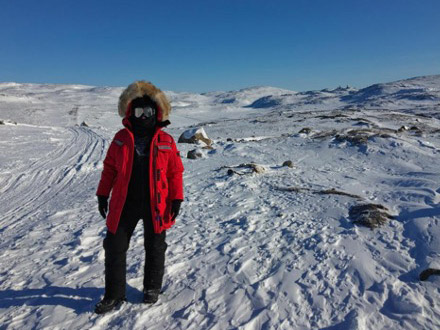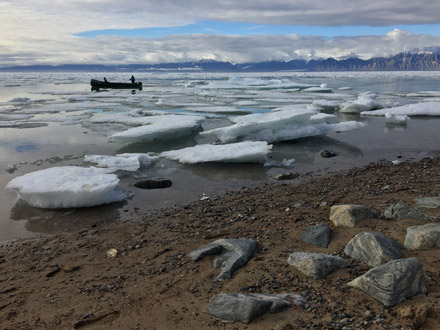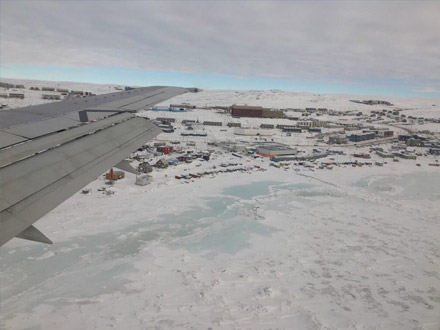By Sappho Gilbert

When I think back to my younger self, I realize how generically I - along with many of my peers - understood the word "community" in the context of human health. Certainly, I could have rattled off some synonyms as units of analysis: a particular group, neighborhood, or population. Yet, I did not fully appreciate the term's three-dimensionality in relation to health - including its equally important, harder-to-epidemiologically-demarcate definitions of togetherness and shared identity or purpose - until my enriching experiences working in global health.
As an undergraduate student and research assistant in biology at the Massachusetts Institute of Technology, the concept of "community" was many magnification levels removed from my molecular perspective on medicine and health. Luckily, I also completed a minor in political science, which fed my macroscale curiosities about laws, institutions, and behaviors salient to health.
As I always say, my passions - biology and political science - were happily married through my subsequent pursuit of a master's in public health at Dartmouth College. There, I built skills in epidemiology, biostatistics, qualitative methods, and policy analysis. I also learned about the ethics and potential for greater, sustained impact of community-engaged health research, which should always be led by communities' voices, needs, and values.
With my academic quiver of arrows in tow, I sought opportunities to apply my education abroad. I first worked with a wonderful, industrious team in Project HOPE's (Health Opportunities for People Everywhere) Bosnia-Herzegovina office on a diverse portfolio of projects spanning community mental health, active and healthy aging, school nutrition, flood relief, and health systems strengthening. In addition, I prepared grants at the interface of government, non-governmental agencies, and supranational organizations. This experience enhanced my knowledge of health care systems and delivery - especially in underserved settings - and the significance of stakeholder partnerships, including community-based and other frontline entities.
With the encouragement of mentors at Dartmouth's Dickey Center for International Understanding and Institute of Arctic Studies, I then applied for and won a Lombard Fellowship. Partnered with a local suicide prevention organization, I investigated mental wellness practices in three communities in the predominantly Inuit, Canadian Arctic territory of Nunavut.

Participants often spoke of "community" - both as a positive and negative determinant of mental health. Thanks to folks' warm hospitality, the sense of "community" also came to life in my own day-to-day while up North: soaking up the midnight sun in Mittimatalik (known as Pond Inlet in English); lying on the tundra near Kangiqliniq (Rankin Inlet) watching the northern lights dance with new friends as one described Inuit legends about the celestial spectacle; playing in a slo-pitch softball league in Iqaluit - go Ravens!; and beyond.
These experiences have been a joyful privilege and further cemented in my mind how interconnected our environments - natural, built, social, cultural, and otherwise - and wellbeing are. This rings especially true in Nunavut, where people and place have long been inextricably linked in subsistence practices and Inuit Qaujimanituqangit, which encompasses traditional knowledge, service to family and the common good, environmental stewardship, innovation and resourcefulness, and other principles. In short, community and health go hand in hand, making the former imperative to understand and appropriately integrate into the design and conduct of population health research.
Currently, I am a doctoral candidate at the Yale School of Public Health (YSPH) in the Department of Chronic Disease Epidemiology and a pre-doctoral fellow at the Yale Center on Climate Change and Health. Recently, I was honored to become a Ruth L. Kirschstein National Research Service Award (NRSA) recipient, funded by NIEHS. I am grateful for the support and collaboration of my multisectoral partners: my YSPH-based sponsorship team - Robert Dubrow, M.D. Ph.D.; Nicola Hawley, Ph.D.; and Rafael Perez-Escamilla, Ph.D. - and additional expert academic advisors - Mahsa Jessri, R.D., Ph.D. of the University of British Columbia and James Ford, Ph.D. of the University of Leeds - as well as the Government of Nunavut's Poverty Reduction Team, Nunavut Tunngavik Inc., the Nunavut Food Security Coalition, the Nunavut Research Institute, and the North West Company.

Broadly speaking, my doctoral research focuses on community-level social and environmental determinants of the nutrition transition away from traditional dietary staples and toward store-bought food in Nunavut. Harvesting is increasingly expensive and dangerous due to rising environmental and weather-related hazards, while store-bought food is federally subsidized via retailers - trends that fuel the nutrition transition. I will examine multiple years of grocery sales data across Nunavut by Inuit-defined season, community size, and periods of safe access to harvesting trails. In lockstep with project partners, I will assess public health implications for the territory. My NRSA will generate evidence contributing to the big, socioecological picture of an evolving indigenous food system and environment. Importantly, community and stakeholder engagement has remained - and will continue to remain - a central fixture at every step of this research: in its formulation, proposal, execution, analysis, and dissemination.
Ultimately, I aim for a career in global health where my studies are always community-engaged, maximize stakeholder win-wins wherever possible, and are readily translatable into actionable, effective changes in health policy and practice.

